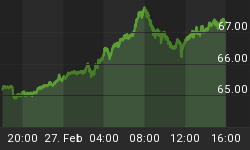Nearly 20 years ago, economists introduced a new term into the English lexicon. The "CNN Effect" was meant to help explain why consumer spending dropped so precipitously starting around mid-January 1991. Supposedly, shoppers stayed home from the malls to watch the first live war on television.
I don't know whether anyone ever proved that a CNN effect actually existed, but I can remember staying up late and being more or less glued to the TV for a couple of weeks myself. I mention it because trading over the last couple of days seems so lethargic, activity so sparse, that it seems the whole world is waiting for the results of the next 48 hours. Yes, stocks rallied. Yes, bonds rallied. Yes, the dollar sold off. The counter-trend "trimming risk" moves that I expected before these events have not happened. But the price action now is on weak volume ("abysmal" was a better description until the last 10 minutes of trading had a flurry of last-minute trades). The market is marking time. And I wonder how much it is also true that businesses and consumers are marking time, waiting anxiously to see whether anything significant will change very soon.
Investors are glued to their Bloombergs, as well they should be. I can't remember when the political-economic landscape last had such a potential for changing so dramatically in the space of two days (at least, two days that we knew about in advance). And, since we know that what we're doing right now doesn't seem to be working, anything that is likely to produce change is welcome (even if we would prefer to have intelligent change over random change).
Why is that? The economic situation we are in is analogous to a position of owning out-of-the-money (OTM) options. When you own OTM options, a rise in implied volatility will increase the delta of your option. Why? Well, because you are out of the money, all of the good things that can happen are "farther away" in a market-price sense. When conditions become more volatile, those "far away" possibilities become more possible, more likely, and our probability of ending up in-the-money increases. The opposite is true with an in-the-money (ITM) option. In this case, all of the bad things that can happen are "farther away." When volatility increases, the delta of an ITM option decreases because the chances of these "bad things" happening (and pushing our option out-of-the-money) increase. Economically speaking, continuing the same policies is a good way to make sure the economy enjoys a similar trajectory to what it has recently seen - flat to weaker. I'd want to try something different. And it looks like the People feel the same way.
Now, this analogy works only as long as we believe that there is not much chance that we can be made substantially worse off with change. (The reason option deltas rise for OTM options when implied volatilities rise is that nothing can be worse than ending up out-of-the-money. In that case, the option is worth zero, so any chance of a non-zero outcome is beneficial.) Given how creative our leaders have been in this regard, it is far from certain that they can't muck things up worse. But (and perhaps I am an optimist) it would certainly seem that there are more opportunities to improve our lot, if only by reversing policies implemented over the last couple of years that were clearly useless or damaging.
This may not be the best analogy, but it is my most hopeful.
When we wake up tomorrow, we will know what the new shape of Congress. We will learn early in the day something about the labor market (Consensus for ADP: +20k vs -39k last month); but by tomorrow afternoon when the FOMC statement is released (see my comment yesterday for my expectations about the likelihood of, and likelihood of effectiveness of, large-scale asset purchases) we will know dramatically more than we do today.
Or will we? The new shape of Congress and the new shape of monetary policy will affect expectations, but it will take months and months before we know whether any of these changes will be sufficiently salutatory to change our fortunes. I expect that once that fact sinks in, we will see the VIX (and fixed-income implied volatilities) decline and the stock market correct. We bought the rumor; now we will sell the news.















